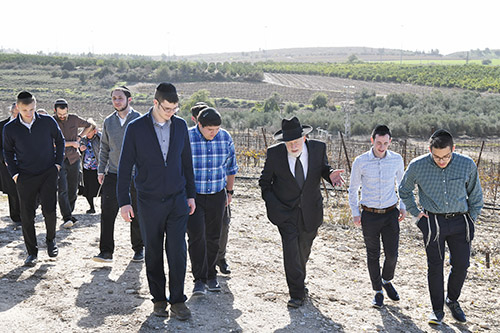


(Courtesy of Yeshiva University) The Jewish agricultural cycle of shemitah may come around every seven years, but for a group of Yeshiva University students, a recent trip to Israel provided a once-in-a-lifetime opportunity to experience this Torah concept firsthand.
From January 8-13, 12 students from YU’s undergraduate colleges and the Rabbi Isaac Elchanan Theological Seminary (RIETS) joined some of the university’s top rabbinic leaders for a first of its kind, on-the-ground education about “Shemitah B’Aretz” (shemitah in the Holy Land), where they gained unique insight into the current year-long farming sabbatical, which began this past Tishrei. The trip was a powerful expression of Yeshiva University’s connection to Israel and its people and its commitment to the core value of Torat Tzion. It also highlighted YU’s unique ability to relate to all sectors of the Jewish people in Israel.
The practice of shemitah takes place during the seventh year of a seven-year agricultural cycle—an observance that began in Biblical times soon after the Jewish people entered the land of Israel. During shemitah, the land is left to lie fallow, with Jewish law requiring most agricultural activity to take a break, like a Sabbath for the land. This practice impacts Israeli farmers and consumers and allows for the taking a collective breather to focus on more spiritual pursuits with the faith that God will provide sustenance.
Yeshiva University partnered with Shnat Hasheva (The Seventh Year), an Israeli organization started by Rabbi Dr. Ari Bergmann (faculty, Yeshiva College) dedicated to spreading awareness of shemitah, and specifically the use of a practice called otzar beit din, to allow for the harvesting and consumption of shemitah fruit. Fruit that grows during the seventh year is “ownerless,” and famers may not charge others to consume the fruit in the fields. They may, however, be appointed by a Jewish court, a beit din, to harvest the fruits on behalf of the public and be paid the costs expended through harvesting the fruit and bringing it to consumers. This method of distributing shemitah fruit has the endorsement of the vast majority of Israeli rabbis across the religious spectrum.
Led by YU’s, Rabbi Bergmann, Rav Elchanan Adler and Rabbi Menachem Penner, the trip included visits with farmers from different backgrounds, experts in produce warehousing and distribution, and esteemed rabbis and decisors of Jewish law, including Rabbi Shmuel Karelitz of Bnei Brak, whose rabbinical court handles the arrangements for the Shnat Hasheva fields and fruits. The RIETS students also visited a winery, picked oranges at a grove in the Golan section of the country and traveled to a range of yeshivot in Jerusalem and Yeshivat Sderot to interact with other students and gain further insights from local roshei yeshiva about this holy practice.
“Too many people see shemitah as a kashrut concern that must be contended with, but in reality, it is a beautiful mitzvah that can bring together the Jewish people and connect them to farmers and the land itself,” said Rabbi Penner, the Max and Marion Grill Dean at RIETS, describing the trip as an unforgettable experience where participants will never look at Israel and its farmers in the same way again. “The students are now ready and eager to bring their eye-opening knowledge home to the U.S. and share it with others,” he added.
Crowdfunding Initiative
Consumption of produce of the land during the shemitah year is permitted, and, according to some authorities, the fulfillment of a Torah commandment under specific conditions. The Shnat Hasheva organization works to guide the Israeli public on how to consume shemitah fruits in accordance with Halacha, especially in ways that bring together farmers and consumers.
Shnat Hasheva is organizing an ambitious project called “Pri Yomi,” through which some 100,000 Israeli students will receive otzar beit din shemitah fruit at no charge for nine months. After having learned about the importance of shemitah, the potential of otzar beit din and the stories of faith from many farmers, the students returned to the U.S. with a mission to raise awareness of and encourage North American donors to help crowdfund for the Pri Yomi initiative.
“As future leaders, the students are inspired to share their appreciation—that even most Israelis lack—of Shnat Hasheva and the underlying beauty of the mitzvah of shemitah, the sacrifices made by farmers and the potential for shemitah observance to unite Jews in Israel and around the world,” Rabbi Penner said, adding that this presents the students with “a very special opportunity to make a difference.”
Feedback from the participating students speaks for itself. Zakkai Notkin (’25 YC) of Teaneck, for example, said, “The shemitah trip provided a fascinating and immersive experience, both from a theoretical halachic perspective to the facts on the ground.”
Yehuda Dov Reiss of Chicago (’22 YC) agreed, sharing that “this trip has been an incredible, unique opportunity to see shemitah in action. We saw how much otzar beit din has a real-world impact on farmers and the entire nation.”
To learn more about shemitah and otzar beit din, visit www.year7.org
Torat Tzion: YU Students Get Up Close and Personal With Shemitah Observance










